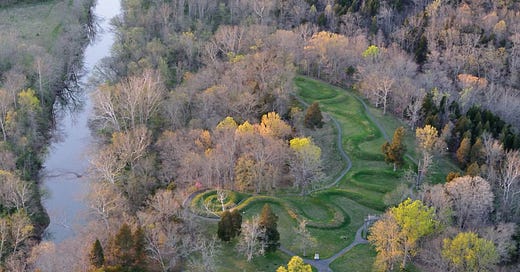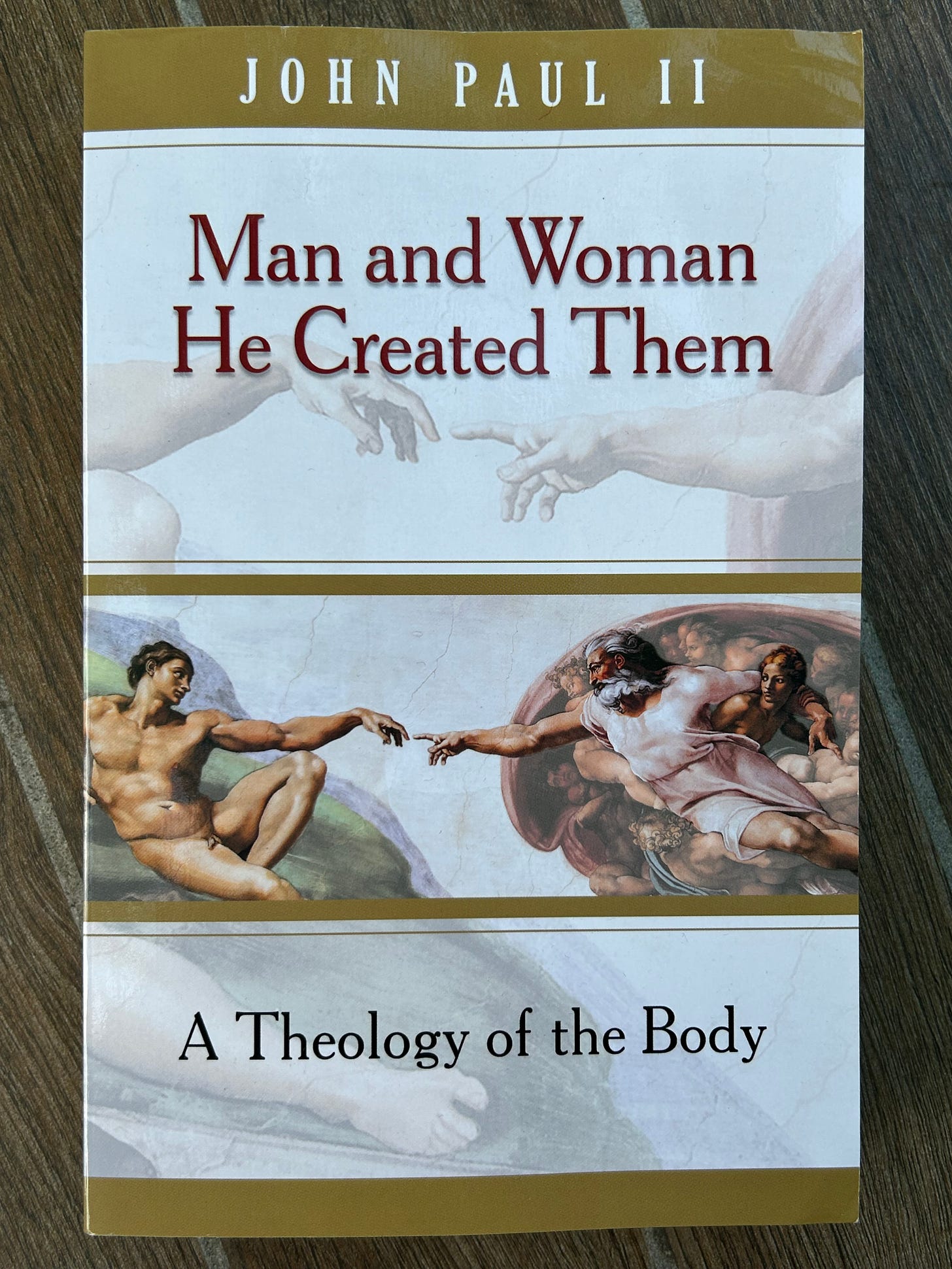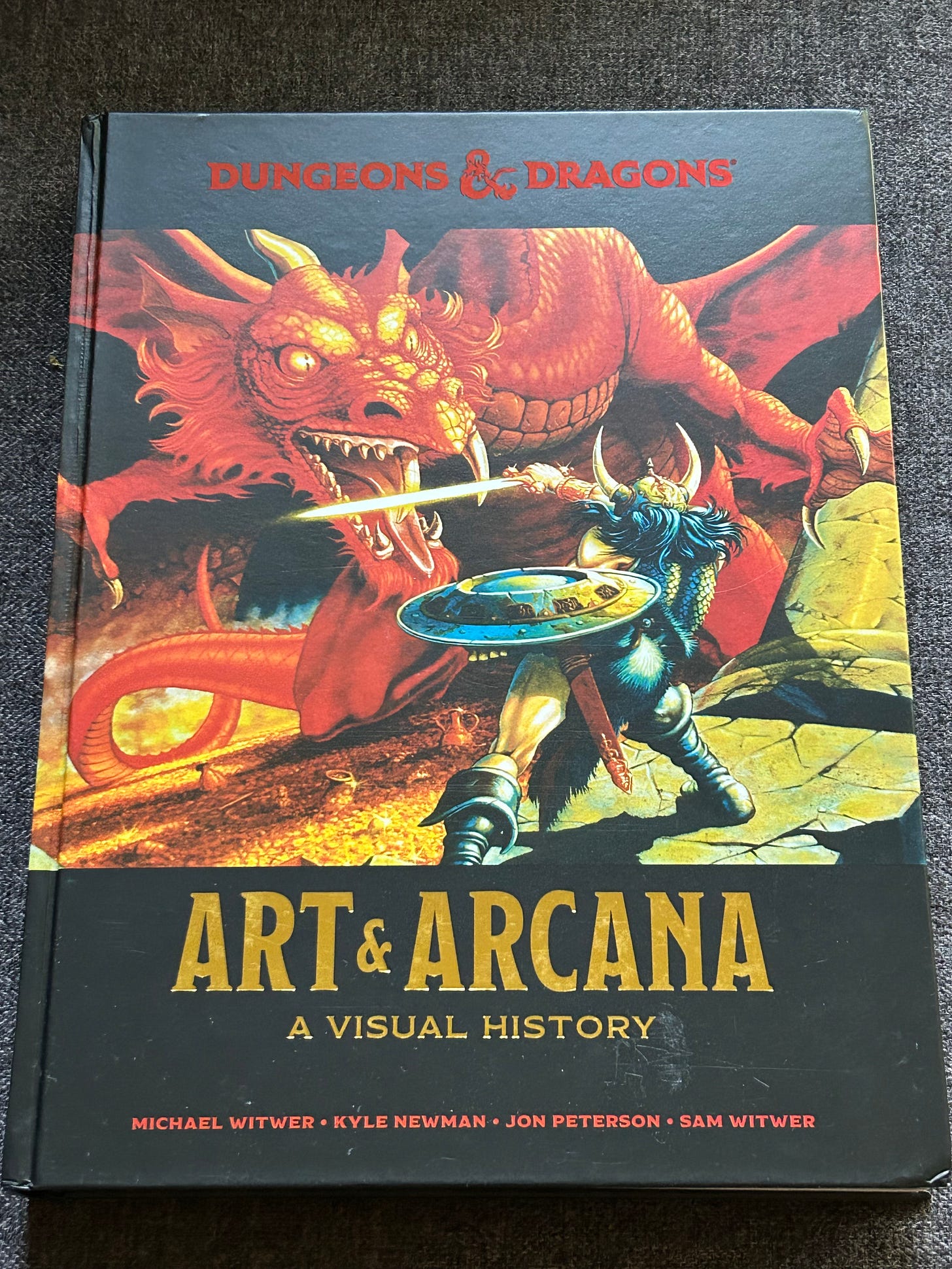(Great Serpent Mound, Ohio. Photograph: Timothy E. Black, Newark Earthworks Center.)
That startled life which runs through us like a serpent, or coils within us potent and waiting like a serpent, this is the dragon. And the same with the cosmos. — D H LawrenceA strange thing happened to me recently: my writing life was hijacked by a new project that is coming together very rapidly. This has never happened to me before. I was supposed to be working on the illustrations for a fantasy manuscript still in need of some other revisions as well. But a couple of weeks ago a story came alive in my mind, complete from start to finish, and I was impelled to begin writing it. Unless I run into some unforeseen obstacle, the novel—I would rather call it a romance—will be ready for submission by the middle of summer. I’m afraid I must use this sudden, intense work as an apology for infrequent posting here, though I still hope to get something up soonish—quite continuous, actually, with this letter—on the tremendous romantic fantasy of E R Eddison, whom I mentioned a little while back.
A few things I can say about my new novel-in-preogress in a blatant attempt to entice readers:
The book is set in Ohio in the summer of 1999. (What, you don’t find that instantly appealing?) The ancient site pictured in the header plays a role, but most of the action occurs in Cincinnati. I need to travel to Cincinnati soon to conduct a bit of research for the story—what I call research, anyway, a complex activity involving cycling and walking around various parts of the city; meeting old friends; loitering in various churches, parks and bookstores; drinking beer and coffee in certain key places; and in general imbibing the place sensorily.
I’ve lately been doing a lot of research (of a more traditional sort) on the history of literary romance and early forms of the novel, going back to what we call the ancient Greek novels (a really fun group of texts I was once lucky enough to teach) and including the revival of that form in the later Byzantine Empire, after it had been sifted through chronicles and histories, hagiographies and miracle stories. This new novel of mine is inspired by that research. Most basically it is about a young man and a young woman, the way they overcome (separately or together, wittingly or not) obstacles to their union, one of which you might call the different worldviews or subcultures they come from.
If that young woman were to be represented in my thinking by a single book (not something I really do as an author, but sometimes it can be a useful reduction), it might be this one:
This edition was not published yet in 1999 but the bulk of its material, Pope John Paul II’s theology of the body (he was still Pope then, not yet canonized), had been available for a while and influential in Catholic and other Christian intellectual circles.
If the young man in the story were to be represented in my thinking by a single book, it might be this one:
Likewise a more recent title, but it’s helping me revisit Dungeons & Dragons as it was in the 90s—or Advanced Dungeons & Dragons as we knew it then. 1999 was the halcyon days of the 2nd edition. I owned many 2e books in the 90s… alas, some other research I need to undertake now is to get my hands on those 2e books. The recent vogue for playing D&D with OSR (old-school rules), basically modified first edition, doesn’t help me because we weren’t doing quite that in the 90s. We didn’t know it then, but we were still living in the days of the old-school. So I have to consult with my friends from that time and remember the game as we first knew it.
Of course I don’t really think of my hero and heroine as represented by a single book each. They both emerged in my mind with freakishly full life and it’s all I can do to keep up with them as they appear on the page. I’m very glad to have met these two young people, and even gladder they’ve met each other. It’s probably for the best that their story happens 25 years ago.
But if I were to assign the hero and heroine additional books, then to the girl I would give the New Testament, which she’s reading in Greek for the first time along with the guy. The girl is enthusiastic about this, the guy rather less so, though they’re both keen Classics students at the University of Cincinnati. If I were to give him another book as emblematic, or in this case an author, it could be Thoreau, some of whose religious inklings I wrote about in the previous post… but as it turns out, in this new novel I’m writing the key figure for our hero is D H Lawrence.
I’m interested in profoundly but unconventionally religious literary figures like Thoreau and Lawrence—just as I’m interested in fantasy—not only as preparation for conversion (they served as such for me) but as possessing something very valuable that Christianity needs to acquire—or reacquire—if it is to continue as a vital religion. That something is a sense of nature, to put it simply: nature as cosmic and nature as local; nature as inherently good because created. And, in the case of Lawrence, nature as the epic of man and woman together (or struggling to be together).
The Norwegian novelist Sigrid Undset (a Catholic convert) was among the first to appreciate Lawrence’s prophetic quality in an essay in her excellent Men, Women, Places. The great critic Philip Rieff (a Jew who was not religious but mourned the waning of Christianity) wrote an insightful introduction to the 1960 Viking edition of Lawrence’s Psychoanalysis and the Unconscious and Fantasia of the Unconscious, and he addressed Lawrence’s work in his own books. Dolores LaChapelle, who was part of the Deep Ecology movement, wrote a book-length study of Lawrence that might seem overly celebratory or uncritical now but is nonetheless worthwhile and representative of one sort of inspiration Lawrence’s work has passed on.
Such diverse recognition notwithstanding, many volumes might yet be filled expounding Lawrence’s thought, particularly as it may be made compatible with, and indeed enliven, orthodox Christianity. It would be inappropriate to call Lawrence a Christian in terms of consciously held belief—at least, not an orthodox or traditional Christian. Though he’s very close. Certainly, he’s Christian in terms of his cultural milieu. He was brought up among the pious low-church Protestant coal-miners of Nottinghamshire, and his literary output it almost singularly a product of and directed back at that world and the larger mainly Protestant culture of which it was a part.
Lawrence had a keen eye—a painfully keen eye—for everything that was (and still is) dead and deadening about modern religion. A hundred years before we started talking about “re-enchantment,” he was there. If he could see our agitated “discourses” today about religion and traditionalism, the battles over “wokeness,” the excesses of an environmental movement turned inhuman, our paranoia and confusion about gender and ethnicity, our plummeting birthrate—he would find none of it surprising.
To borrow the appropriation from C S Lewis, Lawrence had the courage to speak the hard and beautiful truths of the Tao, truths that penetrate as deep in human psychology as they ramify in the external world: truths of embodiment. One of the most refreshing things about his writing is that he was a constructive and energetic thinker, not the whining, defeatist sort of intellectual with which we are oversupplied today. He is rightly called prophetic because the prophet, though he castigates, promises mercy and flourishing for those who return to the Way. Lawrence’s works, then, are hopeful. Or so I find them, still fresh today despite the fact that some of his ideas have not panned out as he intended and expected. But it is the motivation, the vision, behind those ideas that counts, and that vision, as I say, was deeply in touch with the Way of the Creation, its inner nature and symbolism. Lawrence was, in fact, one of the last major authors of realist or “literary” fiction to work unabashedly and sincerely with archetypal imagery and symbolism. This connects him with what we now know as the fantasy tradition… but that’s an essay for another time.
The main thing I want to do here is share a long passage that struck me the other day as I was re-reading Lawrence’s final book, Apocalypse, his commentary on the biblical book of that title along with several fragments of writing on the same topic. I have a hard time restricting myself to this passage—I want to quote half the book—but you never know, maybe a line or two will show up in my new novel. For now, just this one passage, already more than long enough. It is tremendously rich—not with good doctrine, but with a strong, sinewy, heterodox insight about the relation between art and religion, and about the power that the Bible still possesses, a resource religion may yet draw upon to renew itself. That is my take as a Catholic Christian in the 2020s who is looking for ways Christianity can become half-wild and cosmic and pagan again—without losing orthodoxy.
Lawrence died in 1930, shortly after writing these lines, when he was 44 years old. You have to wonder what would have become of him had he been granted another 30 years or more. I do not think he would have embraced a liberalized, gentler Christianity, though you might conclude as much from what he says in the first couple of paragraphs here: the Christian world he describes is not the terminally tenderized one we know today. He is describing what led to that process, but this does not mean he would have gone in the same direction. See where his thought takes him. This is not the argument of an academic, awaiting refutation, but the insight of a poet, one who would have made a great fantasist:
From Apocalypse, ed. Mara Kalnins. Viking, 1980. Pp 117–119:
Religion is not a question of belief, it is a question of feeling. It is a certain deep feeling which seems to soothe and reassure the whole soul. But Christianity is very curious. It seems to have two distinct sets of feeling, one focusing in Jesus and in the command: love one another!—the other focusing, not in Paul or Peter or John the Beloved, but in the Apocalypse. And this second sort of Christianity is weird. It is a doctrine of the chosen people, of the elect: it is based on everlasting hatred of worldly power, and of people in power: it looks for the end of the world, and the destruction of everybody except the Saved. And nearly all Christians and teachers of the Bible today teach this sort of Christianity, the Apocalypse sort.
And this has really killed the Bible for us. The one thing we loathe is this “salvation” business, and especially the people who are “saved.” These horrible “saved” people and all the good godly ones who are right, always right, they have become so repulsive to us that they have made the Bible itself repulsive, and they have killed all our religious responses in us. And when our religious responses are dead, or inactive, we are really cut off from life, because the deepest part of our consciousness is not functioning. We try to take refuge in art. But to my mind, the essential feeling in all art is religious, and art is a form of religion without dogma. The feeling and art is religious, always. Whenever the soul is moved to a certain fullness of experience, that is religion. Every sincere and genuine feeling is a religious feeling. And the point of every work of art is that it is achieves a state of feeling which becomes true experience, and so is religious. Everything that puts us into connection, into vivid touch, is religious. And this would apply to Dickens or Rabelais or Alice in Wonderland even, as much as to Macbeth or Keats. Every one of them puts us curiously into touch with life, achieves thereby certain religious feeling, and gives a certain religious experience. For in spite of all our doctrine and dogma, there are all kinds of gods, for ever. There are gods of the hearth and the orchard, underworld gods, fantastic gods, even cloacal gods, as well as dying gods and phallic gods and moral gods. Once you have a real glimpse of religion, you realize that all that is truly felt, every feeling that is felt in true relation, every vivid feeling of connection, is religious, be it what it may, and the only irreligious thing is the death of feeling, the causing of nullity; the frictional irritation which, carried far, tends to nullity….
[Y]ou can't substitute art for religion, the two being essentially the same. The man who has lost his religious response cannot respond to literature or to any form of art, fully: because the call of every work of art, spiritual or physical, is religious, and demands a religious response. The people who, having lost their religious connection, turned to literature and art, find there a great deal of pleasure, aesthetic, intellectual, many kinds of pleasure, even curiously sensual. But it is the pleasure of entertainment, not of experience. So that they gradually get tired out. They cannot give to literature the one thing it really requires—if it be important at all—and that is the religious response; And they cannot take from it the one thing it gives, the religious experience of linking up or making a new connection. For the religious experience one gets from Dickens belongs to Baal or Ashtaroth, but still is religious; and in Wuthering Heights we feel the peculiar presence or Pluto and the spirit of Hades, but that too is of the gods. In Macbeth Saturn reigns rather than Jesus. But it is religious just the same.
Now the Bible, we know well, is a great religious book. It is full of God. But not, we find at least, to our unspeakable relief, not the chapel God of the grocery-store keepers. The Jews did a wonderful thing when the focused the whole religious feeling of man upon One God. But that does not prevent their Bible from being full of al the gods. It is this discovery which a man can make in his maturity, to his unspeakable relief.
The Bible is full of all the gods. Nay, even the Jehovah of the Old Testament is all the gods, except the dying and redeeming gods. But surely the Jehovah of Genesis and Numbers, Samuel, Psalms, Isaiah, Ezekiel, surely he is all the gods in turn, Dionysic, Apollo-like, strange like Ra, and grim like Baal or Bel. You can’t make an idol to Jehovah because he has the qualities of all the ancient gods in turn, Ouranos or Kronos or Saturn, even the old Osiris, or the mysterious gods of the first Sumerians. He is One because he is all of them, not because he is different from any of them. He does not sit absolute and apart, while all the other gods topple, mere fallen idols. He is himself all the gods and all the idols, savage and fertile, and even he is all the unknown gods that are yet to come….
If this God exists, One and Eternal, then all the other gods exist too. For all the gods are only sides of the One God. We say of a man: Oh, you only know one side of him!— We can say the same of God. We only know one side of him, and a very small side. If we are to know God well, we must know all the gods: which means knowing God on all possible sides….
The Jews were able to make a One God because they came into contact with s many peoples and so many civilizations, so many alien gods, each of which lent something to the Jewish mind, and to the Jewish soul. All the old Jewish poetry is the poetry of adventure with strange peoples and strange gods, and the Bible is perhaps more profoundly a book of roaming than is Herodotus or the Odyssey.
There you have it, dear readers: the Bible as romance.







Looking forward to the romance. This project, your project as a whole, involving Thoreau and a "new transcendentalism," seems very near to my own thoughts. Thank you for your heart in these things.